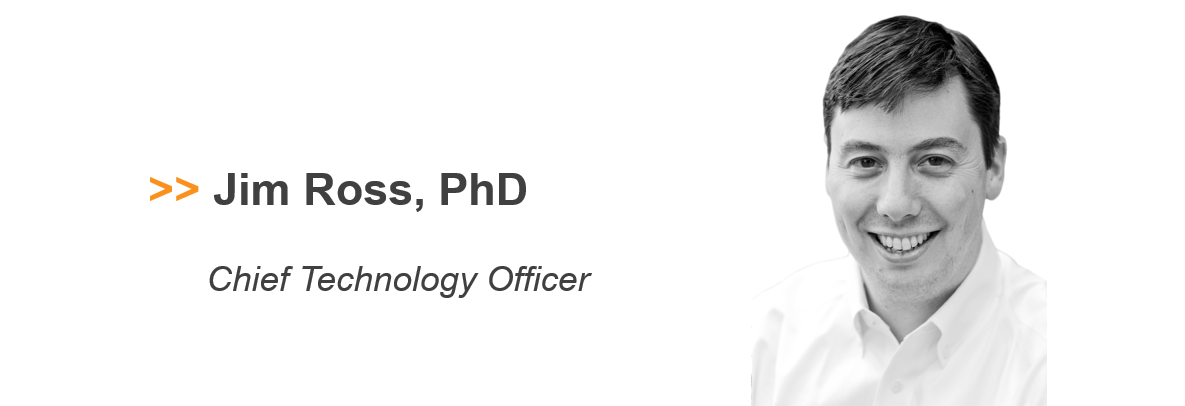
Jim Ross, PhD, received his undergraduate degree in electrical engineering from Louisiana State University and earned his doctorate in neuroengineering at Georgia Tech. Jim co-founded Axion Biosystems in 2008, alongside CEO Tom O’Brien. Two years later, he completed the development of the world’s first multiwell multielectrode array (MEA) system and introduced the Maestro 1 device to the market. This next-generation technology allowed scientists to recreate heartbeats and brain activity in vitro at scale for the first time—accelerating research by collapsing months of experiments into a few weeks.
During his time at Axion, Jim has continued to innovate with the launch of the Lumos optogenetics system, the Maestro Pro and Edge multiplatform systems, and the Maestro Z and ZHT impedance-based live-cell analysis systems.
Jim is a strong supporter of the Axion philosophy to empower scientists and engineers to simplify life science research.
10 questions to get to know Jim Ross
Interviewer: What got you interested in neuroengineering?
Jim Ross: I found the idea of interfacing biology with electronics to be fascinating. From consciousness to movement, electricity is vital to life, yet our body’s electrical signals are still poorly understood and utilized. Neuroengineering creates new opportunities to address some of life’s most compelling mysteries while advancing human health.
Interviewer: What’s the best advice you have for aspiring biotech entrepreneurs?
Jim Ross: It helps to be naively optimistic, but there’s no substitute for a solid plan and a committed team. Good planning ensures you’ve thought through the details, but be prepared to adapt fast as you encounter countless setbacks.
Interviewer: How do you explain your job to your kids?
Jim Ross: I tell my kids we make instruments to (1) recreate human heart beats and brain activity inside culture dishes, and (2) verify that new cell therapies can kill harmful diseases, like cancer.
Interviewer: What is your day to day like as Axion Biosystems CTO?
Jim Ross: Great technology comes from a great team, so these days I spend most of my time gathering input from all divisions of the company to help establish what comes next while ensuring our current projects are on track.
Interviewer: What is the best way to network with others in the field?
Jim Ross: Often, it’s asking friends and colleagues to introduce you to someone new. If you’re just getting started, participating in (virtual or in-person) professional social events is a (more) comfortable way to meet others in your field.
Interviewer: What was the most difficult barrier you have had to overcome thus far in your education or career?
Jim Ross: I am my most difficult barrier. In most cases, overcoming a barrier requires understanding what I’m doing, either out of fear or ignorance, that’s sustaining a problem. For sure, there are external forces/barriers I have no control over; in those cases, you make a reasoned and thoughtful approach while relying on your team for input and support.
Interviewer: How do you see the field advancing?
Jim Ross: Two things:
- The life science field will never stop creating more-and-more complex human biology in culture dishes. Previously, 2D cultures led to 3D spheroids, which led to mini organs; this trend will continue.
- At the same time, our life science tools will extract more-and-more rich information from these increasingly complex cell models… but with a fraction of today’s effort. These trends support the development of new cell therapies that will cure diseases that have no have no remedy today.
Interviewer: What are the biggest challenges in the field?
Jim Ross: In terms of using cells to cure diseases, some of the biggest challenges involve cost-effectively producing the right cells in the right quantities and knowing when a cell therapy will be effective for a particular individual.
Interviewer: What are you most proud of?
Jim Ross: I love working with teams that make elusive opportunities accessible to everyone. I’m proud that we’ve opened up critical biological information to any life science researcher, which accelerates the pace of curing diseases.
Interviewer: Favorite book or podcast?
Jim Ross: I recently re-read Dune. It’s very rich and complex while still being entertaining. Books like Dune really stretch my imagination, which seems to stimulate creativity in my work and home life.